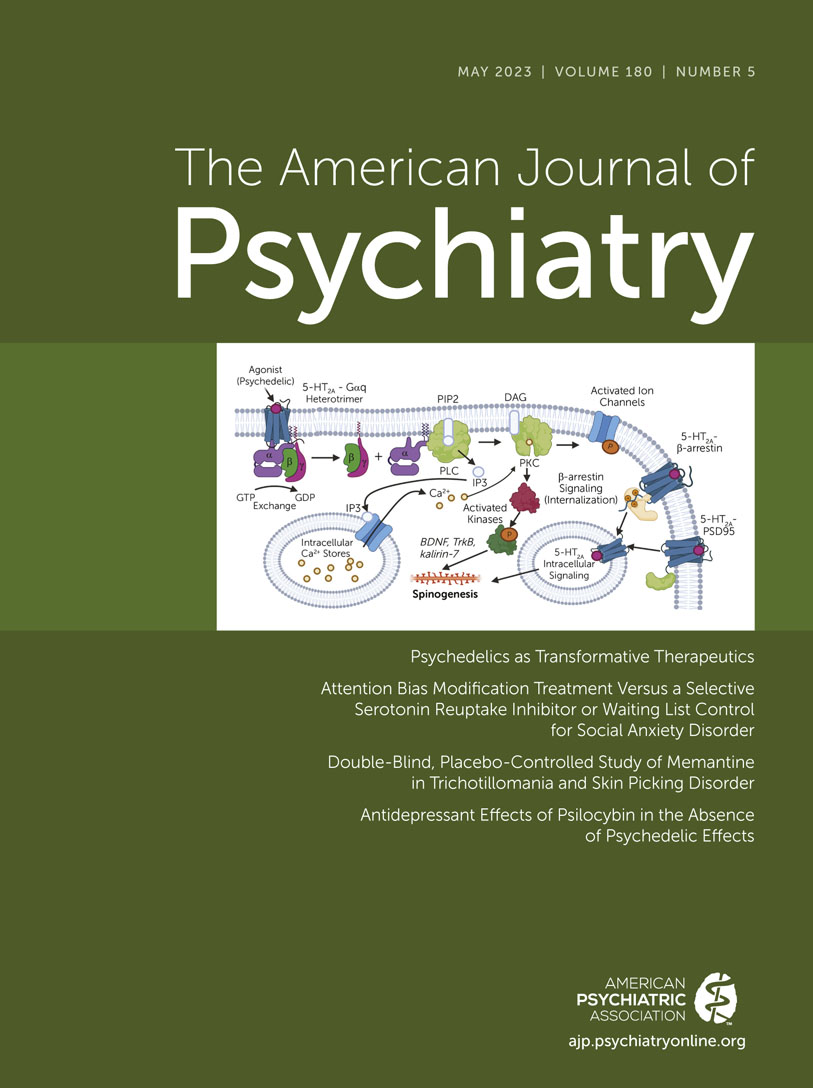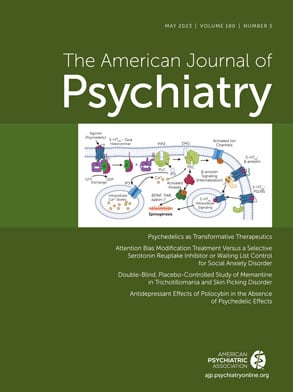We all know Emil Kraepelin as the first scientist to introduce the differential diagnosis of psychosis spectrum illnesses by delineating the observable features and progressive course of dementia praecox in 1893. What is less well known is that he also wrote extensively about “pathologies of the will” (
1), including what we today would call the avolition-apathy or motivation-pleasure cluster of negative symptoms of schizophrenia (
2). Over the past 130 years, these “pathologies of will” have proven to be the most treatment-resistant and functionally impairing aspects of chronic psychosis spectrum illnesses (
3). Individuals with high levels of negative symptoms struggle daily with treatment adherence, social engagement, and goal-oriented activities. In experimental studies, they show neural and behavioral deficits in anticipatory pleasure (motivation for future rewards); they do not allocate effort adaptively; and they do not learn in response to rewards yet remain sensitive to learning from punishment (
4). Indeed, one of the most exciting and fastest growing areas in psychosis research has involved parsing out the neurocognitive and neural system components of impairments in reward processing, effort expenditure, and motivation.
And yet, it took two brilliant psychotherapy researchers, Paul Grant and Aaron Beck, to connect the dots linking avolition to impaired functioning not through a neural pathway, but through a metacognition: defeatist beliefs and the resultant avoidant behavior. In their seminal 2009 paper (
6), they showed that holding beliefs about one’s likelihood of failing (which undoubtedly stems from heightened neural sensitivity to punishment and blunted sensitivity to reward) mediated the relationship of negative symptoms to social functioning (
5), was responsive to cognitive-behavioral therapy (CBT), and resulted in improved outcomes 6 months after treatment, even in people who had serious functional impairment. Grant and Beck’s work has been the cornerstone of today’s real-world treatment approaches for negative symptoms in schizophrenia, which focus on challenging defeatist beliefs and encouraging gradual effortful engagement with social activities and goals.
The randomized controlled trial reported by Reddy et al. (
7) in this issue of the
Journal builds on this foundation. Noting that impaired motivation may itself be a major barrier to successfully initiating and sustaining adherence to CBT, they investigated whether integrating motivational interviewing (MI) methods into a 12-session course of CBT (MI-CBT), delivered in a group setting, would result in a more efficacious and time- and resource-efficient intervention than what has been traditionally reported for CBT delivered alone for negative symptoms. An especially creative aspect of this study was the use of a secondary neurophysiological outcome: pupillary dilation in response to cognitive effort, a physiological marker of cognitive processing demands and associated modulation of norepinephrine and acetylcholine systems (
8). Granholm et al. (
9) had already shown that, in comparison to healthy control subjects, people with schizophrenia with the most severe defeatist beliefs showed the least goal-directed task effort and the most abnormal pupillary responses (less dilation) during a cognitively effortful task, along with high negative symptoms. If MI-CBT could successfully improve components of motivated behavior that include effort expenditure, then one would expect to see an improvement in this pupillary response during cognitive effort (and a downstream improvement in defeatist beliefs).
Reddy et al. found that the MI-CBT treatment, when compared with a well-matched mindfulness-based stress reduction intervention, significantly improved motivational negative symptoms (related to social activities, effort expenditure, and experience of pleasure) at the end of the 12-week treatment course, although these improvements were attenuated at the 3-month follow-up assessment. Significant improvements in the pupillary response measure were also observed immediately after the 12 weeks of treatment, indicating that participants in the MI-CBT intervention improved their cognitive effort exertion compared with the mindfulness control group; however, these improvements were not sustained 3 months later. A nonsignificant improvement in ratings of community function was also observed after treatment, but not sustained at 3 months. These findings suggest the need for longer treatment, booster sessions, and/or additional recovery-focused psychosocial services, which may run counter to the original goal of developing a resource-efficient intervention.
Because the Reddy et al. study did not compare CBT plus motivational interviewing to CBT
without motivational interviewing, it is difficult to know whether the active ingredient contributing to the short-term symptom and neurophysiological improvement was the motivational interviewing, whether it was the CBT, or whether it was due to something unique about the combination. It’s worth noting that a previous rigorously controlled study that compared individual CBT for negative symptoms with a general cognitive remediation control condition (
10) found that the two interventions were equally and moderately successful; the authors speculated that any treatment that provides clear opportunities to experience effort, success, and reward may contribute to reducing negative symptoms (see also reference
9). The MI-CBT intervention in the Reddy et al. study may have provided many more such opportunities than the mindfulness-based control condition, resulting in enhanced motivation and improved cognitive effort expenditure in the short term.
Nonetheless, we are led to ask, Might there be a specific mechanism by which MI-CBT improved motivation and pupillary response in this study? Identifying the key mechanisms of change would allow investigators to optimize the treatment and enhance its durability. We speculate that the strong motivational interviewing emphasis on identifying and building support for individual goals at the start of treatment is likely an important ingredient. In individuals with early schizophrenia, identifying goals at the beginning of outpatient services is associated with improved motivation compared with not identifying goals (
11). In a randomized trial of a smartphone application that targets motivation through goal setting and goal achievement via remote coaching and an online peer community, Schlosser et al. (
12) found improvements in self-defeatist beliefs, self-efficacy, and motivation/pleasure in young individuals with early psychosis compared with a waiting list control group. Consistent goal setting and goal achievement provide “training” for an individual to experience autonomy and competence, two core aspects of intrinsic motivation that are deficient in people with schizophrenia; doing so in a group or social network setting enhances a third aspect of intrinsic motivation—relatedness (
13). As an individual learns to anticipate and experience the successful completion of goals, this would necessarily improve their anticipatory pleasure, their effort allocation, and their self-efficacy (
14).
What might be the next steps for MI-CBT? What other approaches could be added to capitalize even further on this intervention and to strengthen our treatment armamentarium for psychosis spectrum illnesses? As Granholm et al. have suggested (
9), an enhanced cognitive therapy approach like MI-CBT could be very helpful in supporting individuals in engagement with vigorous cognitive training/cognitive remediation programs to improve fundamental aspects of neurocognition that affect real-world outcomes (such as attention, working memory, executive function, and basic social cognition capacities). These programs, when carried out successfully to generate enduring neuroplastic changes, require sustained cognitive effort and can be difficult for individuals to adhere to, even though a wealth of evidence indicates a direct relationship between adherence to training and neurocognitive gains and also between neurocognitive gains and improved functioning at follow-up. It would be especially exciting to see MI-CBT combined with a course of basic social cognition training exercises, since emerging research (
15) suggests that basic social cognition training itself has a specific enhancing effect on anticipatory pleasure, reward processing, and social functioning, and is durable at 6 months. We predict that the combination of the two approaches, metacognitive and neurocognitive, would be synergistic and would prove to be especially powerful in improving pathologies of the will in a sustained manner, particularly when carried out in early phases of illness. Perhaps the most important message of this study, therefore, lies in the reminder that critical neural, behavioral, and functional recovery in schizophrenia requires a sophisticated and targeted multilevel approach that stretches from an understanding of the neurocognitive effects of impaired reward processing to an understanding of the psychological effects of enhanced sensitivity to punishment—an approach that will never be achieved by pharmacotherapy alone.

